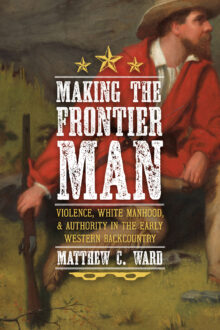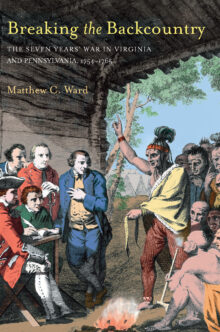
Matthew C. Ward
Matthew C. Ward is a lecturer in the department of history at the University of Dundee, Scotland.
Making the Frontier Man
Violence, White Manhood, and Authority in the Early Western Backcountry
For western colonists in the early American backcountry, disputes often ended in bloodshed and death. Making the Frontier Man examines early life and the origins of lawless behavior in Pennsylvania, Virginia, Kentucky, and Ohio from 1750 to 1815. It provides a key to understanding why the trans-Appalachian West was prone to violent struggles, especially between white men. Traumatic experiences of the Revolution and the Forty Years War legitimized killing as a means of self-defense—of property, reputation, and rights—transferring power from the county courts to the ordinary citizen. Backcountry men waged war against American Indians in state-sponsored militias as they worked to establish farms and seize property in the West. And white neighbors declared war on each other, often taking extreme measures to resolve petty disputes that ended with infamous family feuds.
Making the Frontier Man focuses on these experiences of western expansion and how they influenced American culture and society, specifically the nature of western manhood, which radically transformed in the North American environment. In search of independence and improvement, the new American man was also destitute, frustrated by the economic and political power of his elite counterparts, and undermined by failure. He was aggressive, misogynistic, racist, and violent, and looked to reclaim his dominance and masculinity by any means necessary.
Breaking The Backcountry
Seven Years War In Virginia And Pennsylvania 1754-1765
Even as the 250th anniversary of its outbreak approaches, the Seven Years' War (otherwise known as the French and Indian War) is still not wholly understood. Most accounts tell the story as a military struggle between British and French forces, with shifting alliances of Indians, culminating in the British conquest of Canada. Scholarly and popular works alike, including James Fennimore Cooper's Last of the Mohicans, focus on the action in the Hudson River Valley and the St. Lawrence Seaway. Matthew C. Ward tells the compelling story of the war from the point of view of the region where it actually began, and whose people felt the devastating effects of war most keenly-the backcountry communities of Virginia and Pennsylvania.
Previous wars in North America had been fought largely on the New England and New York frontiers. But on May 28, 1754, when a young George Washington commanded the first shot fired in western Pennsylvania, fighting spread for the first time to Virginia and Pennsylvania. Ward's original research reveals that on the eve of the Seven Years' War the communities of these colonies were isolated, economically weak, and culturally diverse. He shows in riveting detail how, despite the British empire's triumph, the war brought social chaos, sickness, hunger, punishment, and violence, to the backcountry, much of it at the hands of Indian warriors.
Ward's fresh analysis reveals that Indian raids were not random skirmishes, but part of an organized strategy that included psychological warfare designed to make settlers flee Indian territories. It was the awesome effectiveness of this “guerilla” warfare, Ward argues, that led to the most enduring legacies of the war: Indian-hating and an armed population of colonial settlers, distrustful of the British empire that couldn't protect them. Understanding the horrors of the Seven Years' War as experienced in the backwoods thus provides unique insights into the origins of the American republic.


